The Key to Developing Sustainability-Minded Personnel: The Purpose and Vision of the Z Holdings Group's In-House University "Z Sustainability Academia"
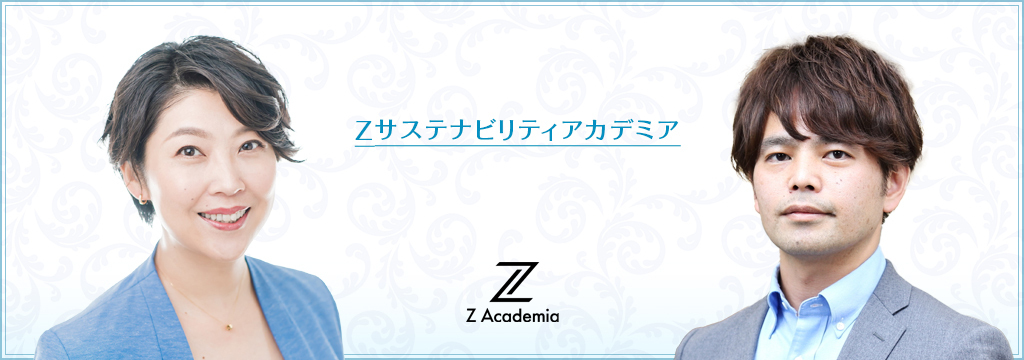
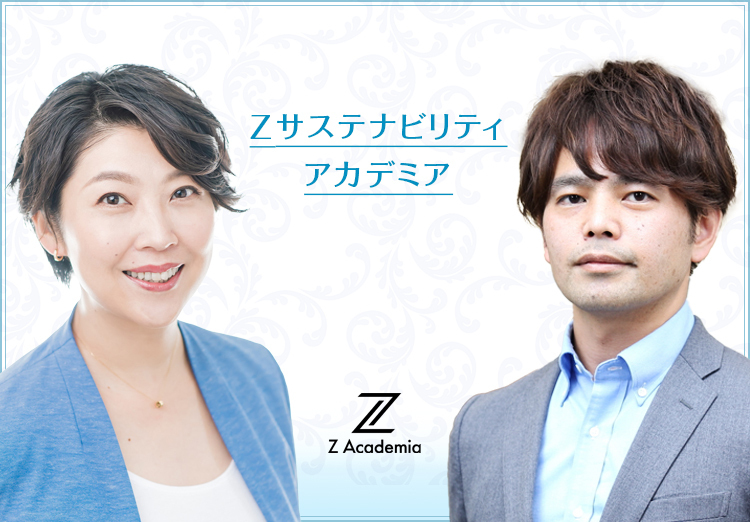
Currently "sustainability transformation (SX)" is gaining much attention, which is the concept of synchronizing social sustainability with corporate sustainability by promoting transformations in management and businesses.
Z Holdings Corporation (hereinafter "ZHD") has engaged in initiatives to promote sustainability transformation throughout the Group, and launched "Z Sustainability Academia" in May 2022 within its in-house university "Z Academia," an academy established to connect the employees across the Group companies and to accelerate Group synergies. Z Sustainability Academia provides a wide range of opportunities for employees to learn and think about sustainability issues that can then be put into practice in businesses
In this interview, we asked Shuichi Nishida, Head of ESG Management Office at Z Holdings Corporation, and Yuka Kowada, Vice Executive Officer, Corporate Communication at ASKUL Corporation and founder of Z Sustainability Academia, about the impact Z Sustainability Academia has had on sustainability transformation education/practices at ZHD so far, and its future vision.
INDEX
PROFILES
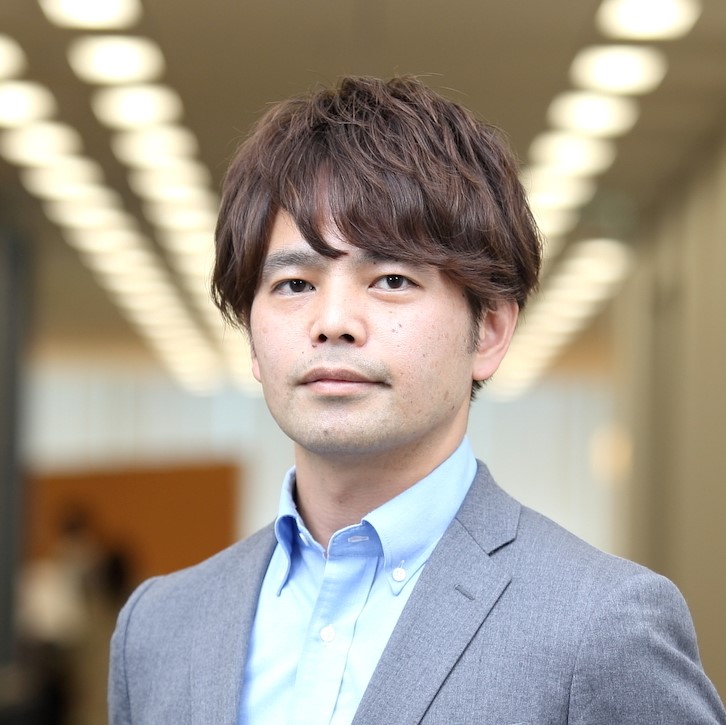
- Shuichi NISHIDA, Head of ESG Management Office, Z Holdings Corporation/EVP, Corporate Officer, President of Social Responsibility Promotion Group, Yahoo Japan Corporation
- Shuichi Nishida joined Yahoo Japan Corporation in 2004 and from 2006, was the manager of the Yahoo! JAPAN top page. In 2013, Nishida transferred to the search division and launched "Search for 3.11: Searching is Supporting," a campaign supporting the reconstruction from the Great East Japan Earthquake. Having served as the Vice President of the Search Business Division and Unit Manager from 2015, he assumed the current position in 2017. From 2021, he concurrently serves as the Head of ESG Management Office at Z Holdings Corporation. Nishida is also a board member of Z Sustainability Academia.
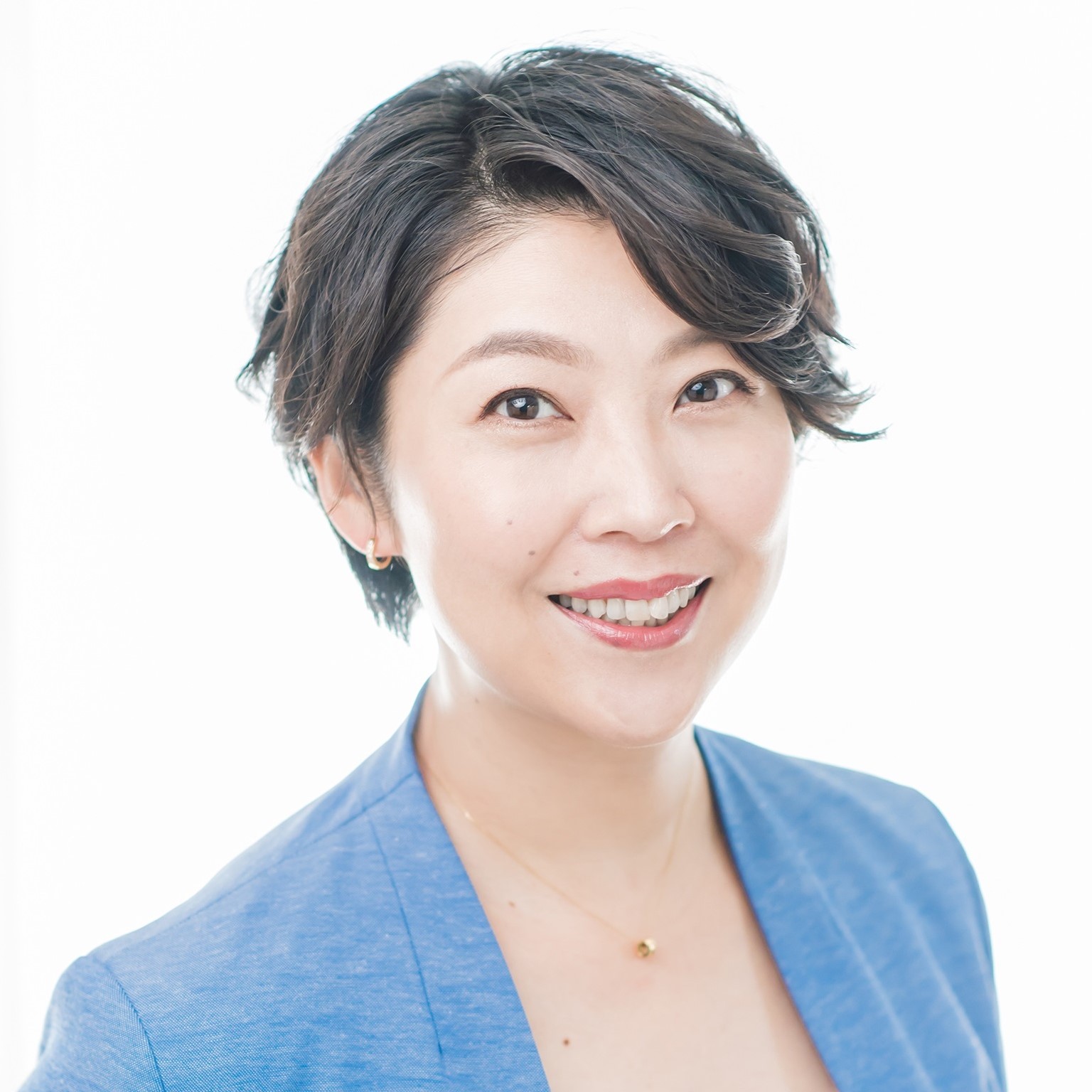
- Yuka KOWADA, Vice Executive Officer, Corporate Communication, Corporate Unit, ASKUL Corporation
- After joining ASKUL Corporation ("ASKUL") in 2007 and working in legal affairs and information security in the Legal & Security Units, Yuka Kowada was appointed head of the PR department, Corporate Unit in 2016, and manager in charge of PR and IR in 2018. In March 2020 Yuka Kowada also assumed the current corporate communication post, following the company's reorganization which placed CSR and PR/IR together under an overarching sustainability division. Founder/board member of Z Sustainability Academia.
Generating Z Holdings' Synergies in Sustainability Transformation
――Japan's Ministry of Economy, Trade and Industry (METI) defines sustainability transformation (SX) as the advancement of management, dialogues, and engagement which "synchronize 'corporate sustainability (sustainability of corporate earning power)' and 'social sustainability (future vision for and sustainability of society)'." What is sustainability transformation and how does ZHD perceive sustainability transformation?
Nishida: Until recently, there was a clear distinction between sustainability-related activities and businesses. However, the idea of synchronizing sustainability with profitable business portfolios and models is becoming more widespread. Sustainability must be considered as a business opportunity and integrated with businesses. This is the direction that sustainability transformation should take.
In order to drive innovation, simply acquiring knowledge on sustainability is not enough. It is imperative that we incorporate sustainability transformation initiatives in our business operations and service development, and to identify the opportunities for creating new values.
――ZHD actively engages in sustainability initiatives, such as its Carbon Neutrality Declaration and disaster prevention/mitigation and disaster relief initiatives. How does ZHD promote sustainability transformation?
Nishida: In FY2021, we established the ESG Management Office as an organization to promote sustainability initiatives. The office has three main functions:
The first is to promote sustainability initiatives in areas such as the environment, human rights, and governance, and to establish a firm foundation for promoting sustainability. Second is to ensure that the management team fully understands the initiatives. And third is to ensure the understanding of those working at the forefront, so that the ideas can be put into practice.
While we felt that we were successfully making progress in the first and second points, i.e., implementing sustainability initiatives and gaining the understanding of the management team, the third point, ensuring those in the forefront in their respective fields understand the idea, turned out to be a challenge.
We had been in search of a way to implement sustainability initiatives in a bottom-up manner, and this was when Kowada-san approached us with an idea, and Z Sustainability Academia was launched soon after.
Kowada: ASKUL has formulated an action plan to promote sustainability and since 2016, we have introduced renewable energy and EVs for our delivery vehicles. While involving myself in these activities, I also felt the challenge and vastness of the tasks. Efforts to achieve a carbon neutral society are implemented towards a long-term future such as 2030 and 2050, and reaching zero CO2 emissions is a challenge that is impossible to realize by ourselves alone. I felt that a strong momentum was needed.
Also, when trying to put sustainability initiatives into practice in your own workplace, even identifying the issues to address can be difficult unless you have the basic knowledge. I suspected that perhaps many people feel the same way, and decided to put my thoughts together and went straight to Nishida-san to present them in October 2021.
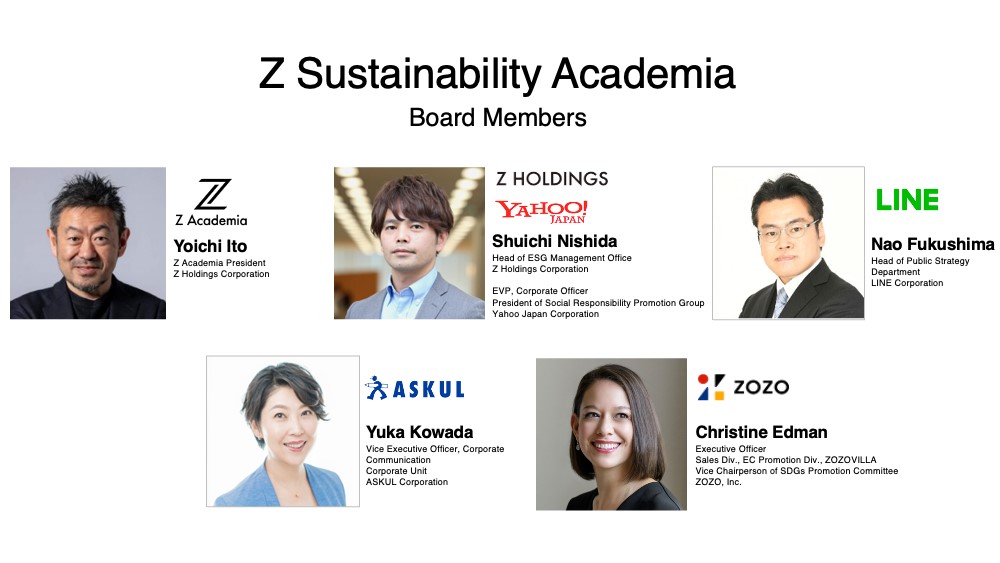
――So you had some expectation that promoting an understanding of sustainability through Z Sustainability Academy could lead to practical implementations.
Nishida: Yes, that's right. In leading ZHD's ESG Management Office, I thought that by bringing together the strengths and appeal of each Group company to promote sustainability throughout the Group, and combining the various businesses of the Group companies with sustainability, we could create new values.
Kowada: I also expected new values to emerge by integrating the businesses of multiple Group companies with sustainability at the core. Our Group is characterized by the diversity in our Group companies encompassing various industries and businesses, including ZOZO, Inc., ASKUL Corporation, Ikyu Corporation, Yahoo Japan Corporation, and LINE Corporation.
I believe that our greatest strength lies in the capability to promote sustainability by combining it with our various businesses. The most effective approach to promoting sustainability transformation is not to undertake the initiatives individually, but to work together as a Group. Through its launch, we hoped that Z Sustainability Academia will fulfill the role of connecting the companies horizontally and that it will become a point where innovations begin.
Linking Z Sustainability Academia to Actual Practice
――Kowada-san made the proposal in October 2021, and about half a year later, the first lecture of Z Sustainability Academia took place. What do you think enabled you to advance with such speed?
Kowada: The initiative did not start from zero. The in-house university "Z Academia" already existed, and so did "Z AI Academia," the community for developing human capital in the area of AI across Group companies. An operational structure was already in place, and I think that's why the launch of Z Sustainability Academia was so smooth.
Nishida: I think another major factor behind the speedy launch was the positive response from the secretariat, including Ito-san, the President of Z Academia, who fully embraced the idea.
Z Academia is open to voluntary participation by all employees, including executives of all our Group companies. Each company offers e-learning programs on topics such as the environment and human rights, but I understand that unless you have a very strong motivation, it is quite difficult to turn what you have learned from these programs into solid action.
On the other hand, even if the number is small, if people with high levels of interest and literacy take positive action, it will attract supporters, and the circle can expand more quickly. So first, we focused on addressing those with higher interest.
Lineup of FY2022 lectures
(No. of participants of the five lectures between May - September 2022: 1,194)
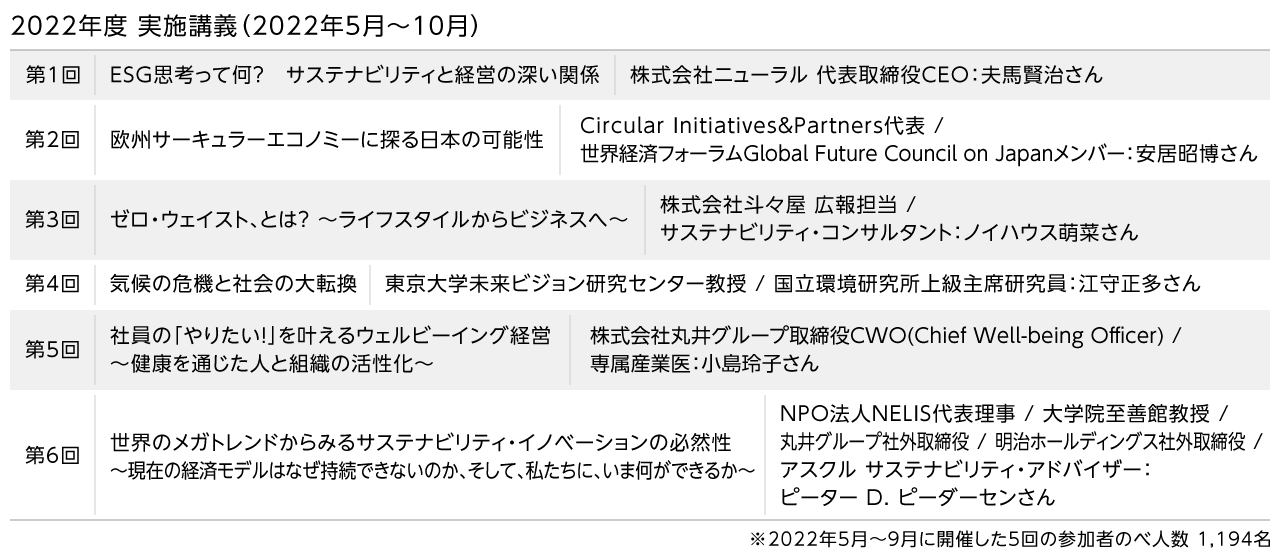
―― Until the fourth lecture, a wide range of subjects are covered. How did you decide on the themes and lecturers?
Kowada: We have monthly meetings with colleagues in charge of ESG in their respective companies, which is an occasion for information sharing. It was in these meetings that discussions took place to select the themes and nominate lecturers, while we also received input through surveys, etc., to determine each company's level of interest. As there are various types of businesses within the Group, naturally, the kinds of initiatives undertaken, and the needs and literacy of sustainability issues vary.
While the content must be relevant to as many people as possible, we must also ensure that participants can each think about sustainability in their own company and apply what they have learned to their work. We therefore aimed to create a place that provides clues for creativity to develop, instead of giving structured classroom lectures.
Nishida: As Kowada-san explained, each company is at a different starting point with a different "sensitivity" to sustainability. Rather than providing a uniform education, we thought about how to flatten out opportunities for the companies.
First, employees of each company can attend lectures of their interest, in which they have a chance to realize or gain something new. This would then hopefully trigger awareness or literacy in their own work or company, leading to new sustainability initiatives. We think that this kind of process is important.
――Have you noticed anything from the response of participants in the lectures so far?
Kowada: It seems that Yahoo Japan colleagues are used to interactive webinars and from the beginning I was impressed by their active participation using chat posts. Perhaps that inspired ASKUL colleagues as they also started posting comments actively. I felt a synergistic effect emerging as a group.
From the second lecture by Akihiro Yasui-san, a reaction button was installed to visualize the response of participants. The button was introduced very quickly in response to feedback from the first lecture. I think such speed and flexibility is possible because we have IT companies on board. In conventional webinars, it was difficult to understand each other's feelings in the moment, but the button made this visible. As a member of a team in charge of operations, this was a major discovery.
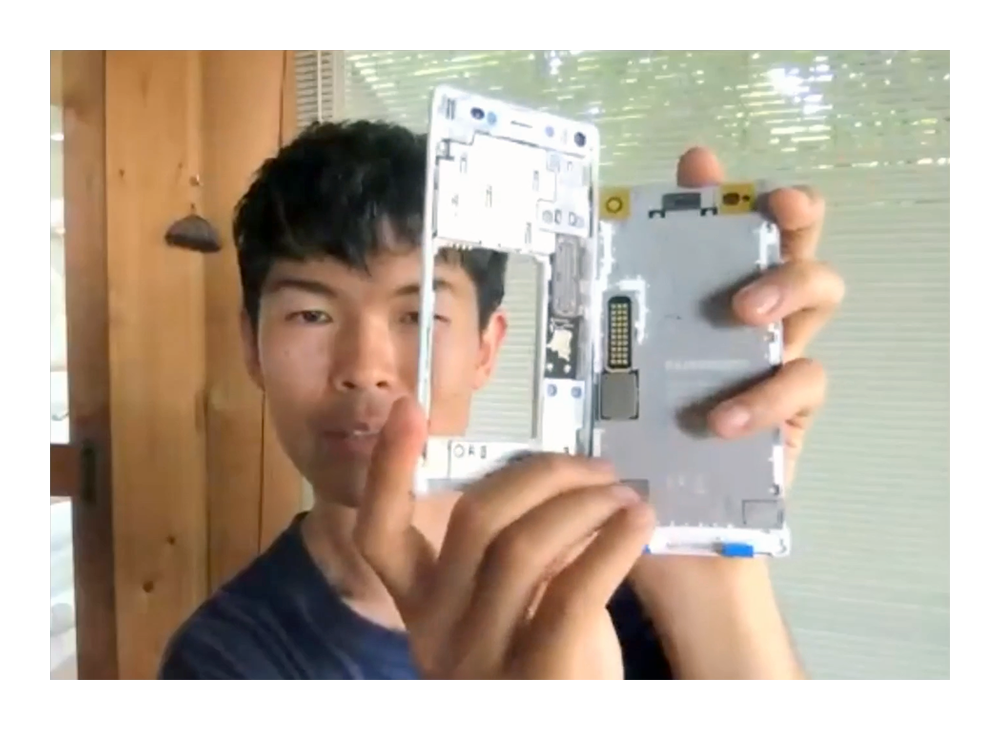
Kowada: Another very interesting thing happened in this lecture. The lecturer explained that, as a trend of the circular economy in Europe, the idea that consumers have not only the right to "use" but also the right to "repair" is widely accepted, and suddenly started to disassemble a smartphone.
The smartphone was a product called "FAIRPHONE" developed by a Dutch company, for which components such as the camera and battery could be replaced part by part. The product had been designed based on the principle that instead of replacing entire devices when they become old, they can continue to be used by replacing individual parts.
The moment the lecturer started taking apart the smartphone, the participants enthusiastically hit the reaction button and I observed the lecture with great interest, thinking "everyone is excited, this really captivated their hearts!" This kind of experience can promote mutual understanding among participants, as well as an understanding of your own position. I would like to make good use of this discovery in future lectures.
Nishida: The same goes for the lecturers. Communication in regular webinars tend to be one way because it is difficult to see the reaction of participants. Seita Emori-san who gave the fourth lecture said that the presence of listeners on the other side of the screen could be felt through the rich reactions. I would like to continue exploring systems that will not only give the lecturers a sense of security, but also motivate them to communicate even more.
Towards 2030: A Future in Which Sustainability-Minded Personnel Thrive at the Forefront
――The introductory part of the monthly series of Z Sustainability Academia will end with the lecture in March 2023. What do you have planned for the future?
Nishida: The board members are now considering how to set up intermediate and advanced level lecturers. One question is how to make use of the enthusiasm and lively discussions that emerge from the lectures. In other words, we must create a forum that stimulates exchange between people.
Kowada: That means enabling various actions, like asking additional questions to the lecturers, having a discussion, and exchanging opinions among participants. Even if we start off small, if there are opportunities for face-to-face exchange, I think expectations to step up sustainability transformations will grow.
For Z Sustainability Academia, I would like to explore mechanisms that takes us beyond just acquiring knowledge, and develop an environment which promotes such experiences.
―― What kind of human capital does ZHD intend to develop through Z Sustainability Academia? Could you explain what an ideal "sustainability-minded personnel" might look like?
Kowada: I think people who can put sustainability transformation into practice and who can integrate businesses and sustainability, as Nishida-san mentioned at the beginning, can be called "sustainability-minded personnel."
Through hands-on learning in Z Sustainability Academia, we can start off with small initiatives by a few people. By taking these small steps, I think that by 2030, all employees and the entire Group will have built the capacity to carry out sustainability initiatives.
In fact there is a sense of urgency that we will not be able to survive the future without going through such transformation. It is my hope that Z Sustainability Academia supports the development of as many personnel with an SX-oriented mind.
Nishida: The concept of corporate social responsibility (CSR) has existed for some time, and in the 2000s, Michael Porter proposed the idea of CSV (Creating Shared Value). In fact, this idea of solving social issues through business activities, turned out to be what sustainability transformation is all about.
20 years have passed from then. Our awareness of social issues such as global climate change and human rights have increased and so has their recognition as business issues. The ability to truly implement the concept of sustainability transformation and to put it into practice while adapting to changes and maintaining profitability - I think these are the requirements for "sustainability-minded personnel" in the future.
Through Z Sustainability Academy, I hope to support the development of such human capital. An increase in sustainability-minded human capital will make our corporate Group much more interesting. I am certain that the Group will be able to create values which leave an impact on the world.
- Date of interview: September 21, 2022 Article published: October 26, 2022
The companies/titles in the article are as of the date of the interview.
Interview/article by Masataka Sasaki Edited by: Note, Ltd.
- Please note that the English translation is provided for reference only. The original, official article is in Japanese.